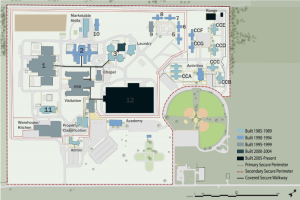Primary election to shape Travis County’s five-member governing body
Two long-time members of the Travis County Commissioners Court face progressive challengers this year in the Democratic primary scheduled for March 1st, with early voting available through February 25th.
Bob Libal, a criminal justice and immigrant rights advocate, is looking to oust Precinct 2 Commissioner Brigid Shea, who represents central and some western parts of the county.
Susanna Ledesma-Woody, a trustee of Del Valle ISD, is for the second time challenging Margaret Gómez in Precinct 4, the southeastern part of the county.
Gómez and Shea have held office since 1995 and 2015, respectively.
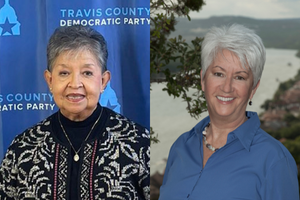
The five-member commissioners court sets the budget and policies of the county, including for roads, jails, the sheriff’s office, social services, and disaster management. The court also has authority over the annual budget of Central Health, which provides indigent healthcare services.
Politically, the court has long been dominated by Democrats but has shifted farther to the left since Democrat Ann Howard replaced the sole Republican, Gerald Daugherty, in 2021. It also underwent a change of leadership in 2020 when Travis County Judge Sarah Eckhardt won a state senate seat and was replaced by Andy Brown, a former staffer of Beto O’Rourke. Eckhardt had defeated Brown in the 2014 Democratic primary for county judge.
In the general election in November, Republicans will put up just one long-shot candidate, Rupal Chaudari, who will challenge Brown, the presiding officer of the court. Republicans will not contest the two commissioner positions on the ballot. That makes the Democratic primary March 1st a more consequential election.
At stake is funding for a new 350-bed women’s jail, which the challengers want to axe, among other issues. More broadly, the election represents a contest between well-connected incumbents and a new generation of activists. While Shea and Gómez are both liberal Democrats, the challengers are looking to outflank them to the left.
Historically, Democratic incumbents in county offices have held a big advantage and served long tenures. For example, County Attorney David Escamilla held office for 17 years until stepping down in 2020, and County Clerk Dana DeBeauvoir held office for 36 years until last month.
But such offices increasingly are becoming a battleground between different factions of the party, making reelection more difficult. Perhaps the best-known example of that was the race for District Attorney in 2020, in which José Garza, a Democratic Socialist backed by Bernie Sanders, ousted Democrat Margaret Moore.
Sanders’ political organization, Our Revolution, has backed both Libal and Ledesma-Woody. Each challenger also has won high-profile local endorsements, and each brings to the race experience in grassroots organizing and advocacy. This combination of outside support and grassroots connections suggests that the challengers are to be taken seriously, and raises the odds of an incumbency-ending upset.
What the incumbents do have is a decided advantage in fundraising. Shea had more that four times as much cash on hand at the end of January as did Libal, and Gómez had more than 10 times what Ledesma-Woody had through the same period. (More about campaign finance later in this story.)
Progressive, Socialist, Democrat
While this is an election for the Democratic Party ticket, both challengers have ties to the Democratic Socialists of America (DSA). Libal is endorsed by DSA, both by the national electoral committee and the Austin chapter of the party. He is formally part of the DSA “slate” of candidates, even appearing in national DSA fundraising pitches.
DSA is a dues-paying organization with its own formal membership and structure, separate from the Democratic Party. However, since 2018 it has become increasingly common for DSA politicians to win office on a Democratic ticket. Famous members who have done so include U.S. Representatives Alexandria Ocasio-Cortez and Rashida Tlaib.
Libal’s socialist leanings go back to his family origins; his grandfather J. Robert Constantine was a labor historian who edited a volume of letters by the socialist leader Eugene Debs and founded the Debs Museum in Terre Haute, Indiana. On his website and campaign materials, Libal doesn’t refer to himself as a Democrat, instead using progressive.
For her part, Ledesma-Woody calls herself a Democrat and has served three times as a delegate at the party’s state conventions. Additionally, she “has been an active member of the Travis County Democratic Party by supporting and block-walking for local Democratic candidates,” according to her website. However, Ledesma-Woody was identified as a DSA candidate in an article by the Texas Observer in 2018, during a previous run for the same office. On her current campaign website she says that she “has strong ties to grassroots organizations that supported her during her last campaigns, like Our Revolution and DSA.”
On social media, Ledesma-Woody also touted the endorsement of the Working Families Party, a minor political party with roots in New York City. Although the Working Families Party tends to endorse Democratic Party candidates, it has its own party structure and dues-paying members.
For these minor parties, endorsing Democratic candidates or running their own candidates as Democrats is a way to participate in a rigid two-party system that otherwise would exclude them from power.
Across these groups, a common denominator is use of the term “progressive.” As highlighted by recent coverage in the San Antonio Express-News, the term is widely embraced by candidates on the left but remains a contested idea that means different things to different people.
Libal and Ledesma-Woody are both using the term prominently in their campaign materials. The incumbents too have long identified as progressives, but they aren’t playing up the label as much as their rivals. “Progressive” doesn’t appear on Shea’s website or campaign materials. In a questionnaire published by the League of Women Voters, she calls herself a “reformer.”
In recent coverage, the Austin Independent and Austin Chronicle both characterized Shea as a progressive, while casting Libal as farther to the left. Shea supported Elizabeth Warren during the 2020 Democratic presidential primary, according to Federal Election Commission donor data.

“The irony of it is, often she (Shea) and I would get into arguments because I thought she was being too liberal. And now she’s being attacked from the left,” said Bill Aleshire, a Democrat lawyer and former county judge who has been critical of DSA influence in the party. (Disclosure: Aleshire represents the Bulldog on public information requests and is a financial supporter as well.)
For her part, Gómez released a campaign video calling herself “a reformer who gets results” and “a tried and true progressive who won’t need on-the-job training.” Her website replicates the video’s wording nearly word-for-word except that, notably, it replaces the word ‘progressive’ with ‘trailblazer’. During the 2020 Democratic presidential primary, Gómez supported Joe Biden, according to FEC data.
Aleshire described Gómez as “progressive to moderate.” He said, “I don’t think she tries to figure out what the most liberal thing is and then go do it. She tries to look at it based on the facts and logic and what seems to be the best thing to do for the most people. Those are more important formulas to her than the colors red or blue or purple.”
‘Invest in people, not prisons’
For Libal, 42, the trigger to enter the race came when the commissioners discussed funding for a women’s jail last year. Plans called for a $72.8 million jail to be built within the existing Del Valle correctional complex, replacing several older buildings. Libal and other critics argued that the plan was a misallocation of resources and was based on out-of-date planning.
Libal’s passion for the issue grew out of his experience as a long-time activist for Grassroots Leadership, which had waged numerous campaigns for U.S. immigration reform and changes to state and local criminal justice policies. For example, Libal was active in the Homes Not Handcuffs campaign against Proposition B last year, and his organization participated in the City of Austin’s Reimagining Public Safety Task Force.
Ahead of a vote on an architectural contract for the proposed jail, Libal’s Grassroots Leadership and other activist organizations waged a pressure campaign urging commissioners to reject the contract and scrap the 2016 master plan for the correctional system.
Libal and other critics pointed out that the county jail population had declined in recent years. Under new county prosecutors, José Garza and Delia Garza, fewer offenders are being tried for property crimes (as the Bulldog reported last year), drug possession, and drug trafficking.
Additionally, longer-running trends have reduced the number of inmates suffering mental health crises or substance-abuse problems. In recent years, police and courts have relied increasingly on alternatives to jail like the Sobering Center, which opened in 2018, and specialty courts focused on pre-trial diversion and treatment. Mental health jail bookings declined 53 percent from 9,465 in FY 2017 to 4,461 in FY 2020, according to a May 2021 presentation by Travis County Justice Planning.
Prison abolition
Apart from the specific arguments against the Travis County facility, Libal is also a critic more generally of mass incarceration in America, describing the U.S. prison system as inhumane and in need of reform. In a recent interview, he described incarceration as a “violent act” that creates “generational harm.”
Asked his views on prison abolition, Libal said, “For me, it’s honestly been an internal struggle as to whether it makes sense to say I am an abolitionist.” He said he identified with abolitionism as a “vision” and “radical critique” that could help point to needed reforms, but noted that he didn’t favor ending “all law enforcement and incarceration today.”
The candidate added, “We’ve tried over the years as a society, just locking up more people, committing that violent act of incarceration against larger swaths of people. But that hasn’t really worked to make communities whole, right?”
Shea defends jail
Libal’s battle over the jail came to a head in June last year. At the request of Precinct 1 Commissioner Jeff Travillion, commissioners scheduled a vote June 8th to approve a $4.3 million design contract with HDR Architecture.
The firm had won a request for proposals put out by the county in 2019. The task of the architects would be to design a jail in line with a master plan endorsed by the commissioners in 2016, as well as a report by an advisory committee appointed by Sheriff Sally Hernandez in 2018. The agenda materials stated, “the current primary facility for women inmates, Building 3, is an older building that is near the end of its useful life span and is becoming increasingly difficult to maintain and operate.”
Heading into the meeting, two members of the commissioners court appeared to be on the side of the activists: Judge Brown and Precinct 3 Commissioner Ann Howard. Brown co-authored an op-ed June 4th with Libal’s co-executive director at Grassroots Leadership, Annette Price. They wrote that building the jail would “perpetuate a system that primarily targets Black and brown individuals,” referring to “racism within our justice system.”
In the meantime, Brown and Howard added a competing resolution to the June 8th agenda, proposing a working group to update the 2016 master plan to focus instead on remodeling existing buildings. On the day of the meeting, more than a dozen activists spoke against the jail during the public comment period. After that, Brown requested a one-week delay, citing a technical problem with the posting language of his resolution.
Shea forcefully opposed a delay, arguing that the planning had already taken years and the new jail was needed to improve conditions for female inmates. “We have a legal responsibility to maintain the jails, and not just to the very least minimum standards—there’s enough of that in Texas already…I’m very appreciative of a lot of what the advocates have done, but at the end of the day, we have an unpleasant and unpopular responsibility to maintain the jails. We in the court don’t say who’s in the jails. That happens through the judges and the court system. But once they’re there we have a responsibility to maintain the jails.”
History of civil rights violations
Shea also reminded the court that Travis County had been under federal enforcement for overcrowding at jails in the 1980s and 1990s “because we had not invested in the jail facilities and they were inadequate.”
“Many buildings which were thrown up in haste at that time are not in good shape,” she said.
Aleshire, who was county judge from 1987 to 1998, told the Bulldog that the federal oversight stemmed from a civil rights case styled Ruiz vs Renfro (later Ruiz vs Aleshire). It pre-dated his term and continued until after he left office.
“We had a crisis on our hands because we didn’t have enough room, enough guards, or enough facilities to have programs to reduce recidivism and help the people while they were in jail to come out better than they went in. We had to build quickly and some of that stuff was never intended to still be being used 30 years or so later. They’re almost barracks-style things. Especially the number of women in jail has increased dramatically since the mid 1990s so we were looking at building facilities primarily for men, and some of those facilities were later converted for women.”
Years of planning scrapped

Travillion joined Shea in defending the proposed jail, saying that it would be more humane to house female inmates in one “state-of-the-art facility” rather than scatter them across several dilapidated ones. “What we have already was not designed for women, it was designed for men,” he said.
Gómez emerged as the swing vote. She endorsed the remarks of Shea and Travillion but agreed to a week’s postponement as a courtesy to Brown. “This is our duty and we need to face it,” she said. The motion to delay passed 3-1-1, with Shea opposed and Travilion abstaining.
During the requested week-long delay, activists stepped up their pressure campaign, and Brown escalated his public opposition to the jail. The Statesman ran an article headlined, “Travis County’s top administrator calls for scrapping plan for new women’s jail, starting over.”
At the next meeting June 15th, nearly 100 callers testified against building the jail. Brown and Howard moved to “pause for at least 12 months any decisions on the design or construction of any new jail facility.”
At that point, Gómez changed positions, saying she would support a delay: “We can’t walk away from having a facility for women but if it helps for us to hold off a few months so that we can bring everybody on board as to understanding the issue…then I think it might be worth the time.”
Shea objected: “Any delay in making these long-term decisions about plans for the women’s facility will have a substantial and negative impact on women in custody in Travis County.” But even she relented in her opposition after hours of testimony, as did Travillion. They joined a unanimous vote delaying any design contract for at least a year—until after the election.
The fight motivated Libal
The decision was a big win for activists and it emboldened Libal to launch his campaign. “Those kind of fights motivate me,” he said in a recently published interview, in which he also criticized Shea for being “condescending” toward activists who had dialed in to oppose the jail.
Libal said, “I get very motivated when I see people who’ve been affected by injustice standing up and speaking for themselves. And when I see people in positions of authority ignoring or condescending or co-opting and disregarding their views. I think the women’s jail fight over the last couple of months has been a prime example of both of those things.”
Since then, Libal has made the jail the focus of his campaign, printing yard signs that say “Justice Not Jails,” along with his campaign logo. Similarly, Ledesma-Woody launched her campaign in June 2021, a day after the commissioners court debate on the jail. In a Twitter thread, she linked her decision to the issue. “We do not need to invest in the expansion of jails,” she said. “Invest in people not prisons!”
Libal’s other campaign promises
Apart from the jail issue, Libal is also campaigning on housing affordability. He says he’ll work to ensure timely rental assistance to residents, make more investments in homeless services, establish a new County Housing Director position, and strengthen the rights of tenants of county housing.
On his website, he says he’ll also fight against I-35 expansion, which he says would contribute to greenhouse gas emissions.
Libal touts his support for “healthcare for all,” a goal that Travis County is working toward through its budget oversight of Central Health, the Travis County agency that levies property taxes to pay for indigent healthcare services. The county also needs to do more to prevent drug overdoses, he says. According to data from the Travis County Medical Examiner, overdose deaths rose 35 percent from 2019 to 2020.
Another talking point for Libal is corporate tax incentives. He’s repeatedly attacked Shea for voting to approve property tax abatements for auto manufacturer Tesla, which is building a factory it calls Giga Texas. “We need to support families and communities in need, not give tech billionaires millions in tax breaks,” he said in a Twitter thread.
Shea has defended her vote, writing in the voter guide published by the League of Women Voters, “Our agreement with Tesla creates 5,000+ jobs for the 50 percent of our adult population with less than a college degree, offering insurance, retirement, and a ladder out of dead-end jobs.”
Shea: Environmental focus
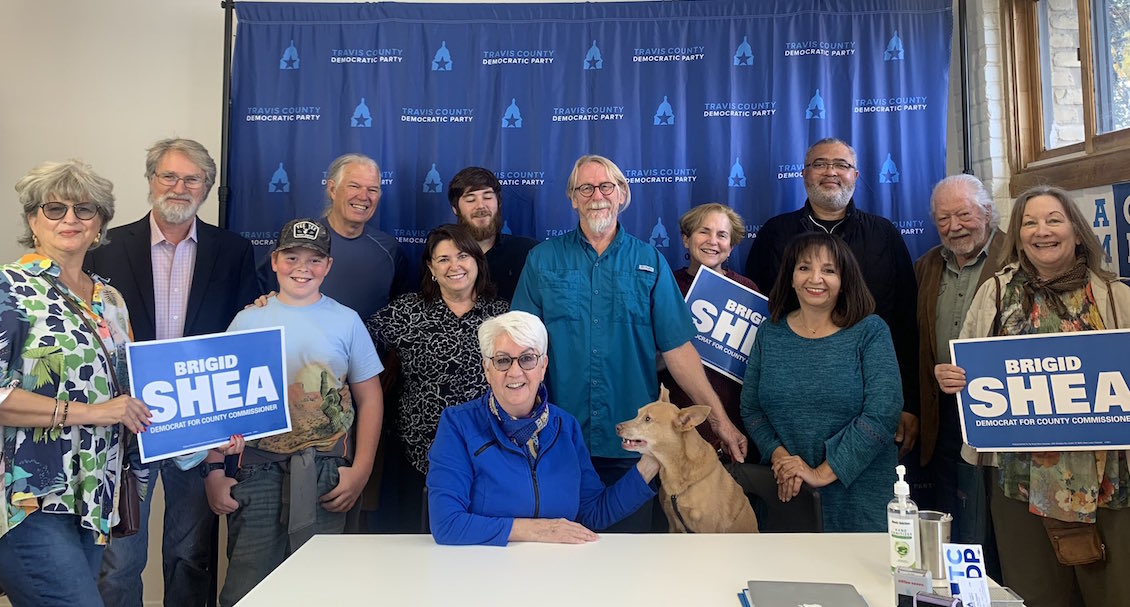
Shea, 67, has made tackling climate change the focus of her reelection campaign, calling it “the most pressing social-justice issue of our age, as the harm falls hardest on poor communities.”
Since she took office in 2015, she says the county has made big strides in countering the “devastating effects of climate change.” The county implemented “one of the most aggressive telecommuting policies in the region,” which reportedly allows 75 percent of county employees to telework permanently and reduced emissions from commuting by 30 percent. It also transitioned to using reclaimed wastewater to air condition buildings, and made plans to convert its fleet of vehicles to all-electric.
Shea’s involvement in environmental causes goes back decades. She co-founded the Save Our Springs Coalition in 1990, a group that successfully defeated some of the city’s most powerful developers and launched her political career. In 1993, she won a seat on the Austin City Council, serving until 1996. She then returned to work for the renamed Save Our Springs Alliance before founding an environmental consulting practice in 2000. As detailed in a past Bulldog background investigation, Shea’s firm did extensive contract work for local governments. Shea then made a failed bid to unseat incumbent Mayor Lee Leffingwell in 2012 before winning the position of county commissioner in 2015.
Shea’s other reelection promises include creating more affordable housing and continuing criminal justice reform. In an effort to counter Libal’s attacks over the women’s jail, Shea has highlighted her past support for creating the county’s Public Defender’s Office and the Sobering Center, which serves Austin and Travis County as an alternative to the emergency room or jail and, where appropriate, provides a bridge to recovery.
Ledesma-Woody campaign
Ledesma-Woody, 39, has served as a Del Valle ISD trustee since 2011. She won her first election in 2010 and ran for reelection unopposed in 2014 and 2018. Additionally, she challenged Gómez once before for the position of county commissioner. In the March 6, 2018, Democratic primary, she lost by 7,422 votes to 3,453, or 68.25 percent to 31.75 percent.
The boundaries of the Del Valle school district overlap and almost completely encompass the area covered by Travis County Precinct 4.
Her campaign in 2018 focused on bringing basic services to southeast Travis County, such as public transportation, health services, and road maintenance. “We’re tired of having to beg for basic resources and services,” she said, as quoted in coverage by the Chronicle at the time.
This time, Ledesma-Woody is making similar promises, with a greater emphasis on housing and homeless services, as well as the women’s jail.
Ledesma-Woody has also struck an anti-corporate tone similar to Libal’s, pointing out that as Del Valle ISD trustee she voted against a tax deal for Tesla. “I’m the only Travis County elected official that voted against corporate tax breaks for Elon Musk’s Tesla company,” she says on her website. Her opponent, the incumbent Gómez, abstained from the decision. She was the only commissioner to do so.
Ledesma-Woody works as a project manager at Advanced Micro Devices, a semiconductor company. Her position as Del Valle ISD trustee is unpaid and her current term expires in November. She’s also a mother of three and president of the Del Valle Community Coalition, a nonprofit that she helped found about 15 years ago.
‘Tough critic and steadfast leader’
Apart from her policy views, Ledesma-Woody is also campaigning more generally on the idea that it’s time for a change, highlighting Gómez’s 27-year tenure. On a fundraising page, for example, she calls for “new energy” and “active leadership.”
At candidate forums, she’s suggested that she’ll fight harder for constituents than the incumbent. “I’m running because I’m tired of seeing our community suffer. I have the experience and I have the drive and I will fight with urgency for long-neglected issues that face our community,” she said at a candidate forum hosted by Our Revolution.

Paul Saldaña of Saldaña Public Relations, a supporter of Ledesma-Woody and a Precinct 4 resident, described the candidate as a “strong, vocal critic” of the city and county governments for failing to provide healthcare services and other infrastructure in the area.
“Gómez has failed to utilize the bully pulpit as the Commissioner of Precinct 4 to improve the quality of life for residents in Precinct 4,” he told the Bulldog. “She’s been passive and MIA. And it’s not rocket science to link the decades of neglect and lack of infrastructure in Precinct 4 to the Commissioner’s failed leadership.”
Gómez rejects that characterization. At a candidate forum hosted by Habla y Vota, she said: “The last four years we have invested $100.2 million on the infrastructure (in Precinct 4): roads, drainage, park improvements, and bicycle safety investments bring rooftops to the area.”
Saldaña served as an AISD trustee from 2015 to 2017 and got to know Ledesma-Woody during that time, when she was on the Del Valle ISD board. Both also served on the City of Austin’s Regional Affordability Committee. More recently, the two worked together as leaders of the Austin Latino Coalition and Del Valle Community Coalition, which provided education and resources to residents to battle the COVID-19 pandemic.
Saldaña said, “Prior to the pandemic and throughout, Susanna has been a strong advocate, voice and leader volunteering countless hours to serve the residents of Austin, Travis County with honor and distinction. She has been a tough critic and steadfast leader, holding elected and appointed officials accountable. Most importantly, she offers the lived experience of Precinct 4 and represents the next generation of leaders we need.”
Gómez campaign
Margaret Gómez, 77, spent 13 years as a Travis County constable starting in 1981, before being elected county commissioner in 1994. She was the first female constable in Travis County and the first Mexican-American. She’s been described as the “quietest commissioner” on the court. She says her experience and connections help her get things done behind the scenes.
Aleshire, who’s known Gómez since 1980, said, “She’s a quiet leader, unlike some of us that are a little more bombastic. She’s a quiet, humble, but effective leader on the court…She’s been part of every major effort on healthcare and transportation.”

As a long-time incumbent, Gómez is trying to make this election as much about experience as issues. Her campaign video features an endorsement from Gonzalo Barrientos, a retired state senator (D-Austin), who describes her as experienced, sensible, and compassionate.
Barrientos says, “What we need right now is stability. Stability in government, stability in families, stability in the U.S., in the world. And I think (we get that) with Margaret, to make sure we use common sense.”
Gómez has downplayed policy differences with Ledesma-Woody and tacked to the left on the jail issue, glossing over her previous support for building a new women’s jail, which goes back years and is well-documented in multiple media reports. But Gómez now casts herself as an opponent of the project. She wrote on her website that she was “the deciding vote to halt construction of a new jail in Travis County.”
If reelected, Gómez has also pledged to make roads safer, enforce subdivision regulations, and improve EMS and fire services. In its endorsement, the Statesman wrote, “These aren’t flashy initiatives but they demonstrate an important focus on the nuts-and-bolts of Travis County government.”

Gómez and her supporters have also gone on the attack against Ledesma-Woody, questioning a vote that she took as Del Valle ISD trustee. Carol Guthrie, business manager of AFSCME Local 1624, which is supporting the commissioner, said in a recorded video that the challenger failed to support a proposal “to provide additional compensation” to cafeteria workers and bus drivers.
At issue was a proposal for hazard pay for hourly employees involved in food distributions at the outset of the pandemic when schools were closed. Guthrie said, “Ms. Woody chose to organize other board trustees to vote against these workers so that they would receive no additional compensation for risking their lives every day.” According to video of the board meeting, trustees had already approved time and a half for the workers. At issue was whether they should instead get double pay.
Ledesma-Woody said her opponent “conveniently left out” key facts about the matter in an attempt to smear her as someone who doesn’t support school workers. She defended her record as a trustee, saying on a livestream hosted by Our Revolution on February 7th that the Del Valle ISD board had raised wages for nine consecutive years during her time in office and increased healthcare benefits and provided childcare services.
Dirty tactics
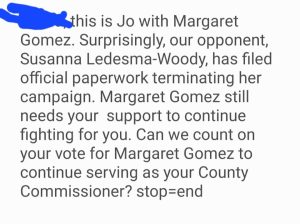
Things got even more heated when Gómez’s campaign allegedly sent text messages to voters claiming that Ledesma-Woody had dropped out of the race.
Ledesma-Woody had erroneously filed a campaign finance form saying she did not intend to accept any future political contributions or make further expenditures. The Gómez campaign seized on that and sent out emails and text messages to supporters saying, “Surprisingly, our opponent, Susanna Ledesma-Woody, has filed official paperwork terminating her campaign.”
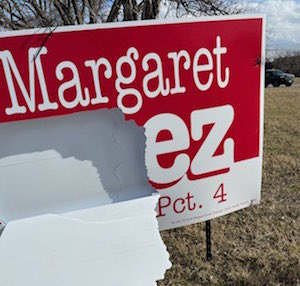
The challenger slammed this tactic as “shady politics” and a “desperate attempt to stop our momentum.”
Separately, however, Ledesma-Woody’s own campaign was accused of dirty tactics, after campaign signs were stolen and vandalized. Gómez’s campaign accused Brandon Braley, a paid campaign staffer. Gómez posted a voice recording of a phone call with the staffer, in which he seemed to admit to taking the signs.
Braley, a former president of the University of Democrats and legislative aide to State Rep. Jasmine Crockett (D-Dallas), said Tuesday on social media that the incident was “petty drama” and disparaged Gómez’s signs as having been “paid for by a Trump supporter”—a reference to billionaire Joe Liemandt, who donated $25,000 to her campaign. But he added, “To avoid any sense of impropriety I am renouncing any payment from the campaign.”
Gómez had demanded the return of the signs and an apology. “The law was broken,” she said.
Campaign finance
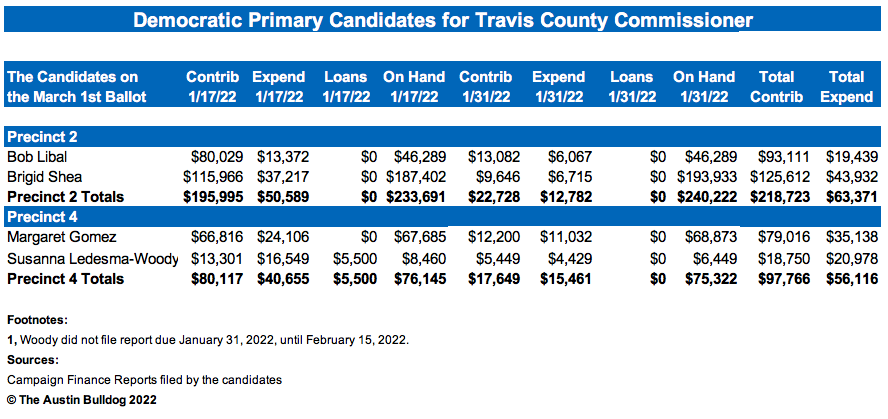
Libal raised $93,111 through January 31st, including $6,250 of in-kind donations, $4,000 of which was staffing services provided by DSA in Action, according to campaign finance filings. Much of his haul came from small-dollar donors.
Shea raised $125,612 through January 31st, but because of money left over from previous campaigns, she had $193,933 on hand, four times as much as the $46,289 Libal had.
Public sector union PACs donated generously to Shea, including the International Association of Fire Fighters PAC ($10,000), Lake Travis Fire Fighters PAC ($12,500), Austin Firefighters PAC ($500), Austin/Travis County EMS Employee Association ($1,030), and Vote PAC ($5,000), which is affiliated with AFSCME Local 1624.
Shea’s other top donors included Husch Blackwell LLP ($7,500), Armbrust and Brown PLLC ($5,175), Peter Barlin ($5,150), James Carpenter ($5,000), Ellyn Yacktman ($5,000), Rohan Patel ($3,001), Lisa Lin ($3,000), Lynne Dobson ($2,575), Sam Kumar ($2,500), Linebarger Goggan Blair & Sampson LLP ($2,500), Mary Beth Maher ($2,500), Roger Beasley Investments LLC ($2,500), and John Scott ($2,500), among others.
For her part, Gómez raised $79,016 through January 31st and had $68,873 on hand. She received substantial contributions from unions representing county employees: $10,000 from the Travis County Sheriff’s Law Enforcement PAC and $2,500 from Vote PAC.
Ledesma-Woody raised $18,750 through January 31st and loaned her campaign $5,500. Her largest contributor was Ana Vital ($1,500).
Catina Voellinger, the finance director at Collective Campaigns, is providing in-kind campaign services to both Woody and Libal campaigns, per filings. Voellinger was the treasurer of Equity PAC, which ran the successful No Way on Prop A that defeated the November 2021 police staffing initiative.
Endorsements
Bob Libal is endorsed by Austin DSA (Democratic Socialists of America), District 4 Council Member Jose “Chito” Vela, Austin Justice Coalition Executive Director Chas Moore, other criminal justice activists, Friends of Hyde Park, and Our Revolution, among others.
Brigid Shea is endorsed by The Austin Chronicle, Austin American-Statesman, University Democrats, and Austin Environmental Democrats. In its endorsement, the Chronicle praised Shea’s record while also giving an approving nod to Libal. “We hope that facing a legit primary challenge from Bob Libal—former head of Grassroots Leadership, running to Shea’s left on criminal justice, economic development, and the built environment—will help Shea take her service to the next level.”
Susanna Ledesma-Woody is endorsed by Black Austin Democrats, Austin Environmental Democrats, University Democrats, Pflugerville Mayor Victor Gonzales, Run for Something, Ground Game Texas Co-Founder Julie Oliver, Council Members Natasha Harper-Madison and Vanessa Fuentes, Education Austin, and The Austin Chronicle.
Margaret Gómez is endorsed by the AFSMCE Local 1624, Austin Firefighters Association, Capital Area Progressive Democrats , LiUNA Local 1095, Austin Environmental Democrats, the Austin American-Statesman, Congressman Lloyd Doggett (D-Austin), State Senator Judith Zaffirini (D-Laredo), State Representative Eddie Rodriguez (D-Austin), County Judge Andy Brown, and fellow commissioners Jeff Travillion and Brigid Shea, among others.
 Trust indicators: Bulldog reporter Daniel Van Oudenaren is a journalist with 13 years experience in local, state, and international reporting.
Trust indicators: Bulldog reporter Daniel Van Oudenaren is a journalist with 13 years experience in local, state, and international reporting.
Related Bulldog coverage:
Bolstering confidence and participation in Travis County elections, November 19, 2021
Background investigation: Brigid Shea, April 10, 2021
Candidate websites:
https://www.votemargaretgomez.com/
https://www.bobforcommish.com/
https://susanna4commissioner.com/
Disclosure: Brigid Shea and her husband are sustaining supporters of the Austin Bulldog for $10 each monthly.


